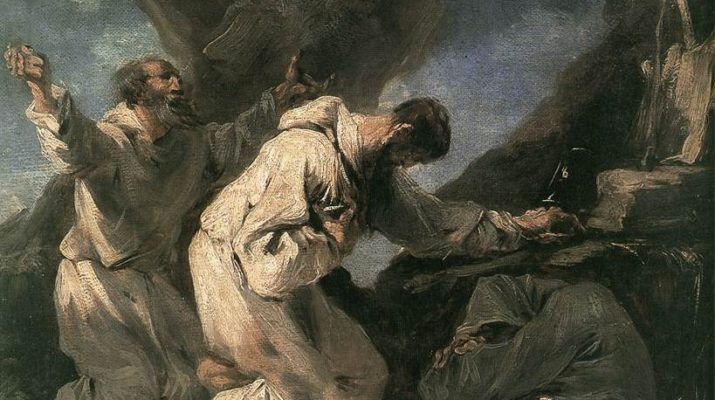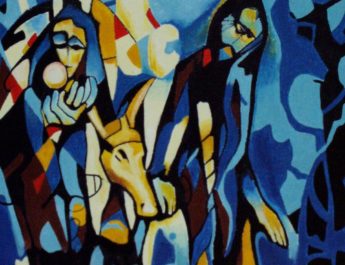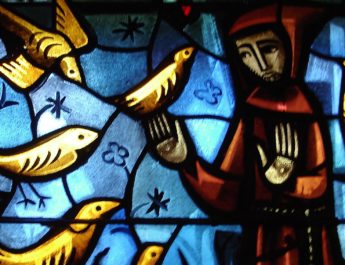Psalm 4
To the leader:A with stringed instruments.B A PsalmC of David.D
A “leader” = natsach. Properly, something that glitters from a distance. So, something that stands out, excels, has status/standing (such as a chief musician or superintendent of Temple services). This can also mean to be permanent or enduring.
B “stringed instruments” = neginah. 13x in OT. From nagan (to strike a stringed instrument, to pluck or play it). This is music, a song, a taunt, or a stringed instrument. It can also be a poem given a musical setting.
C “psalm” = mizmor. From zamar (making music; used specially of music to worship God; music with singing, singing praise, singing psalms); may be from zamar (to trim or prune). This is a melody or a psalm.
D “David” = david. From the same as dod (beloved, love, uncle); the root may mean to boil, which is used figuratively to describe love. So, this implies someone you love such as a friend, a lover, or a close family member like an uncle. David’s name likely means something like “beloved one.”
1 AnswerE me when I call,F O GodG of my right!H
E “answer” = anah. This is answer, respond, announce, sing, shout, or testify. It means to pay attention, which implies responding and, by extension, starting to talk. Used in a specific sense for singing, shouting, testifying, etc.
F “call” = qara. This is to call or call out – to call someone by name. Also used more broadly for calling forth.
G “God” = Elohim.
H “right” = tsedeq. This is rightness, righteousness, vindication. It is everything that is just or ethical. That which is right in a natural, moral, or legal sense. It also includes just weights (i.e. true weights). Figuratively, this is justice, righteousness, equity – even prosperity.
You gave me roomI when I was in distress.J
Be graciousK to me, and hearL my prayer.M
I “gave…room” = rachab. This is to grow wide or enlarge in a literal or figurative sense. It can also mean extend, relieve, rejoice, or speak boldly. This is the verb that Rahab comes from
J “in distress” = tsar. From tsarar (to bind, restrict, narrow, be cramped, an adversary). Properly, this is a narrow or constricted place. Figuratively, it can be trouble, a pebble, an enemy, anguish, or distress.
K “be gracious” = chanan. This is to beseech, show favor, be gracious; properly, to bend in kindness to someone with less status.
L “hear” = shama. This is to hear, call, consent, or consider. It implies listening intelligently, giving attention, and, because of these two factors, obedience and action are often implied.
M “prayer” = tephllah. From palal (to judge for oneself or in an official capacity; to pray or make supplication, to entreat). This is prayer or intercession. It can also be a hymn.
2 How long, you people,N shall my honorO suffer shame?P
N “people” = ben + ish. Literally “you children of humankind.” Ish is perhaps from enosh (human, humankind, mortal); from anash (to be weak, sick, or frail). This is man, husband, another, or humankind.
O “honor” = kabod. From kabad (to be heavy, weighty, burdensome). This is weighty. Figuratively, glorious, abundant, riches, honor, splendor – a reference to one’s reputation or character. This word is often used to describe God and God’s presence.
P “suffer shame” = kelimmah. From kalam (bearing shame, bringing dishonor or disgrace, humiliate insult, taunt, embarrass, reproach; properly to wound in a figurative sense). This is insult, disgrace, dishonor, humiliation, shame, or reproach
How long will you love vain words,Q and seekR after lies?S SelahT
Q “vain words” = riq. 12x in OT. From ruq (to pour out in a literal or figurative sense, hence, to be or make empty). This is to be empty or to make empty; also vanity, emptiness, something worthless, in vain.
R “seek” = baqash. This is to seek, ask, desire, or request. It can be any kind of searching. It can also mean to worship or pray – implies a striving for.
S “lies” = kazab. From kazab (to lie, be false or in vain, to fail; to deceive in a literal or figurative sense). This is a lie or deception. It can also be used figuratively to refer to an idol.
T “selah” = selah. From salal (to lift up, build, pile, extol, exalt; can also be used for opposing as a dam holds back water). This is to lift up or exalt. Also, “selah” in the psalms where its precise meaning is uncertain. It could be a pause in the music, a moment of silence. It could signal a change in the service or mean something akin to amen.
3 But knowU that the LordV has set apart the faithfulW for himself;
the Lord hears when I call to him.
U “know” = yada. This is to know, acknowledge, advise, answer, be aware, be acquainted with. Properly, this is to figure something out by seeing. It includes ideas of observation, recognition, and care about something. It can be used causatively for instruction, designation, and punishment.
V “Lord” = YHVH. From havah (to be, become) or hayah (to come to pass, become, be). This is the name of the God of Israel, the self-existent and eternal one, the tetragrammaton. This pronunciation has been lost to time so “Lord” is generally used in its place.
W “faithful” = chasid. From chasad (being good, kind, merciful; may mean bowing one’s neck as is done in the presence of an equal for courtesy’s sake; so, if one in a superior position is treating you like an equal, that is what is captured here). This is faithful, kind, pious, merciful, or gracious. It can also refer to godly or pious people. This is where Chasidic Jews take their name from.
4 When you are disturbed,X do not sin;Y
ponderZ it on your beds, and be silent.AA Selah
X “disturbed” = ragaz. This is shaking from any strong emotion, particularly anger or fear. It can be agitated, excited, perturbed, afraid, quaking, quivering.
Y “sin” = chata. This is properly to miss, and so figuratively it is used for sinning, bearing the blame. It implies a forfeiture or loss of something.
Z “ponder” = amar + lebab. Literally “say within your heart.” Lebab may be related to labab (to encourage; properly, to be encased as with fat; used in a good sense, this means to transport someone with love; used in a bad sense, it can mean to dull one’s senses). This is the heart, courage, one’s inner self, the mind, or the will. Heart is only used in a figurative sense in the Old and New Testaments.
AA “be silent” = damam. This is to cease, be or become mute, silent, still, cut off, hold peace, be astonished, or die.
5 OfferBB right sacrifices,CC
and put your trustDD in the Lord.
BB “offer” = zabach. This is slaughtering an animal, generally for the purpose of sacrifice. It can mean kill or offer.
CC “sacrifices” = zebach. Related to “offer” in v5. From zabach (see note BB above). This is a sacrifice or offer – the animal flesh or the act of making an offering.
DD “put…trust” = batach. This is to hide for refuge, be secure or sure. Figuratively, it refers to trust, being confident, or hoping.
6 There are many who say, “O that we might see some good!EE
Let the light of your face shine on us, O Lord!”FF
7 You have put gladnessGG in my heart
more than when their grain and wineHH abound.
EE “O that we might see some good” = mi + raah + tob. Literally “who will show us good?” Tob is good, beautiful, pleasant, agreeable, bountiful, at ease. This word is used for goodness as a concept, a good thing, a good person. This can refer to prosperity and welfare as well as joy, kindness, sweetness, and graciousness. So, this is ethically good, but also enjoyably good.
FF “let the light of your face shine upon us, O Lord” = nasa + al + or + paneh + YHVH. Literally “lift up upon us the light of your face, Lord.” Or is from or (to be or become light). This is light, sun, sunshine, dawn, or daylight. Figuratively, it can refer to light from instruction, light of a face (that is to say one that is cheerful or finds favor). It can refer to prosperity or salvation; a light that guides, a light eternal from Zion.
GG “gladness” = simchah. From samach (to rejoice, be glad; properly, to brighten up; also used figuratively). This is joy, rejoicing, pleasure, or glee.
HH “wine” = tirosh. From yarash (inheriting or dispossessing; refers to occupying or colonizing – taking territory by driving out the previous inhabitants and living there instead of them; by implication, to seize or rob, to expel, ruin, or impoverish). This is new wine or sweet wine – wine that is freshly squeezed. Sometimes used for fermented wine.
8 I will both lie down and sleepII in peace;JJ
for you alone, O Lord, make me lie downKK in safety.LL
II “sleep” = yashen. This is to be languid or go slack. By implication it an mean to sleep, become old or stale, or die.
JJ “peace” = shalom. From shalam (to be complete or sound; to have safety mentally, physically, or extending to one’s estate; so, if these things are safe and complete, the implication is that one would be friendly; and, if being friendly, one would make amends and that friendship would be reciprocated). This is completeness, soundness, welfare, favor, friend, good health. It is to be safe and figuratively well, happy, at peace, friendly. Abstractly, it includes the ideas of welfare and prosperity (not in excessive wealth, but in having enough).
KK “make me lie down” = yashab. This is to sit and so to remain and so to dwell. It is sitting for any reason – as a judge, in order to ambush, or just sitting quietly. Causatively, this can mean settling or marrying. This can also mean continue, endure, or establish.
LL “safety” = betach. Related to “put…trust” in v5. From batach (see note DD above). This is a place of refuge, safety, security, or assurance. Figuratively, it can be confidence or trust.
Image credit: “Praying Monks” by Alessandro Magnasco, 18th century.




